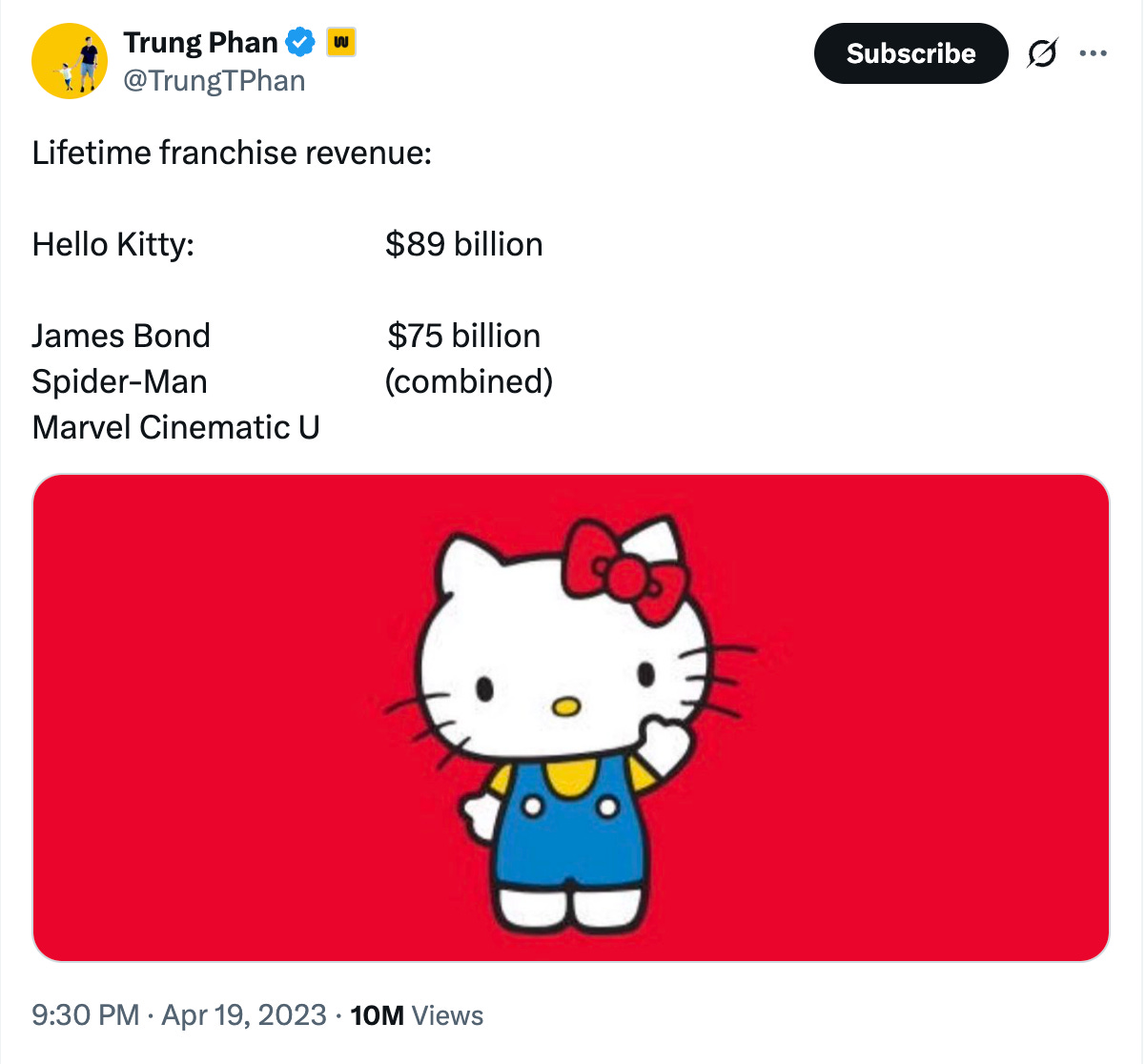Vicky Gu | September 2, 2025
The Unicorn Bubble Tea Edition
On out-raising Blank Street, cultural confidence, and Hello Kitty.
Vicky Gu (VG) is a friend of WITI. She’s an editor, strategist, & poet. Find her Substack here.
Vicky here. I loved the below tweet, about how Hello Kitty’s lifetime franchise value ($89 billion) tops that of Marvel, Spider-Man, and James Bond combined ($75 billion).
As she should, I proudly say as a Sanrio-loving Asian female. (The type who only slays with cutie Kirby in Super Smash Bros Brawl.)
Why is this interesting?
Our cultural power isn’t just evidenced by film franchise valuations. It also plays out in everyday drinks.
Last Chinese New Year, I went to Brooklyn’s Sunset Park to check out the freshly arrived Chinese tea chain, Molly Tea. It was packed. (Imagine a room half the size of Starbucks with double the workers and clientele, who mostly looked like Chinese nationals.) Everyone got a thick red envelope with their drink, containing a discount for their next order. With its gold embossing, it could’ve doubled as the authenticity certification slip to a new Ferragamo bag.
I’ve hit branches of the Taiwanese drinks chain ChiCha San Chen in Manhattan, Carrollton (Dallas), and at a mall in Bellevue (Seattle). The prices—say, $9.78 for one drink—put third wave coffee shops to shame. It also took me a minute to remember the name, which is purely made of Romanized Chinese characters—no Westernized rebrand to create easier recall for non-Chinese speakers. I initially thought it was a missed brand move, but now I think it’s brilliant.
The arrival of both unicorn and franchise-driven bubble tea brands is something that many coffee obsessives are likely still unaware of. A pioneer in WeChat marketing, HEYTEA had raised $578M by its Series D, for a $1.28B valuation. A jasmine tea specialist, Molly Tea's Flushing flagship generates $480,000 in monthly revenue, while their second San Francisco store ran up $28,000 in first-day sales. (For context, Blank Street Coffee is valued at $500M after raising $135M in its Series B.)
But Chinese brands aren't just good at social media and attracting investors; they're big on ingredients and quality. Expect pure teas, seasonal fresh fruit like persimmons and cherries, multi-tiered sugar levels, and toppings like house-made taro balls. Think Blank Street’s VC-funded real estate strategy meets Shake Shack’s focus on making burgers better, not just scaling them.
My experience at Molly Tea during CNY wasn't one of a business catering to Americans who happen to like bubble tea. That was a business serving Chinese people who happen to be in Brooklyn.
It flips the Western global market entry narrative. Instead of "How do we make Americans love bubble tea?" it's "How do we serve Chinese taste (and income) wherever it travels?" Selective market capture is a strategy too.
Starbucks scaled internationally by globalizing American beverage habits. These brands are growing by serving consumers with intuitively Chinese taste, or maybe Chinese-curious taste. Pass a HEYTEA in Manhattan today and you’ll find a mix of students, tourists, and locals discovering something new on their walk to work. Something alluring, even if it wasn’t made for them.
It’s Hello Kitty supremacy again. Sometimes cultural confidence beats cultural accommodation. (VG)
